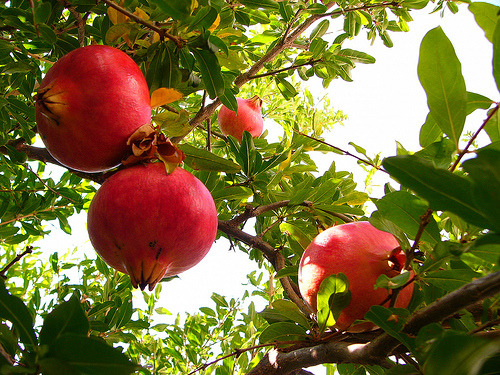The Pomegranate Tree
 |
| "Hassan had said in his letter that the pomegranate tree hadn't borne fruit in years.Looking at the wilted, leafless tree, I doubted it would ever again." |
There is an abandoned cemetery with a single pomegranate tree that has somehow managed to thrive in the dirt and rubble. This tree strongly depicts Amir and Hassan’s relationship. Despite belonging to classes on the opposite ends of the spectrum, Amir and Hassan grew up like brothers. Similar to the unlikely event of a luscious tree booming in infertile land, Amir and Hassan overcome the set rules about these different classes coming together. They made each other’s childhoods regardless of society’s disposition. This tree is a symbol of their childhood where Amir would read Hassan stories, where they carved their names, where they spent the hours of daylight under. While this tree symbolizes a unifying force, it also is a basis of division between Amir and Hassan. This is established through various incidents surrounding the tree. Even though Amir and Hassan enjoy hearing stories in each other’s company, Amir, always trying to outdo Hassan, takes pride in the fact he is able to read where as Hassan doesn’t have that same education. Amir seeks satisfaction by ridiculing Hassan and finding anything he is better at him in. Furthermore, there is the incident where Amir wants Hassan to hit him back with the pomegranate to get a sense of relief by lessening the weight of guilt he carries for letting Hassan get raped by Assef, instead of fighting for him; the same way Hassan arguably would have given his devotion to his friend. In response to this Hassan breaks the fruit over his own head. This is an accurate depiction of how their relationship works. No matter what Amir says or does, Hassan still never wishes bad upon Amir. He rather take the suffering than hurt Amir, showcasing his devotion and loyalty. Up until this incident, Amir has always attacked Hassan being the dominant one of the two in this relationship. After Amir leaves Hassan forever, he returns to a foreign land where terror runs the streets of Afghanistan. He goes back to the place where the tree once bloomed, now just ancient remains of a friendship that once thrived.
The Slingshot
 |
| "Hassan and I fed from the same breasts. We took our first steps on the same lawn in the same yard. And, under the same roof, we spoke our first words. Mine was Baba. His was Amir. My name." |
The slingshot represents bravery associated with standing against wrong. It is found in two generations; first with Hassan and then with his son, Sohrab. Both Hassan and Sohrab use it against Assef. The first time it's used is when Hassan threatens to use it against Assef to protect Amir and himself. The slingshot reappears when Sohrab actually ends up using it to defend Amir when Assef is thrashing him. If he hadn't blinded Assef with a shot to the eye, Amir could have very well died. The slingshot is a symbol of courage as it’s used to stand up for what’s right when others won’t. It represents the kind of person Hassan is. He never wishes bad upon anyone even if the other person wrongs him. Hassan would never hurt anyone or let anyone he loves go through any sort of pain. When it comes down to the person he loves, his brother, in trouble with Assef and his crew, he doesn’t hesitate to pull out the slingshot showcasing his heroism. The slingshot is also a symbol of what Baba wishes Amir to be. Throughout the book we get the sense Baba loves and cares about Hassan just as much as he does for Amir. However, Baba, being the strong and righteous man he is, expects his son to have inherited his desirable characteristics. Time after time Amir proves to be a coward when he always let’s Hassan fight his battles for him, disappointing Baba and leaving himself to find ways to outdo Hassan and gain the respect of his father. Although Baba’s courageousness isn’t reflected in his son when it should be, Hassan’s heroism is found in Sohrab.
Kites
 |
| "For you, a thousand times over." |
Afghans kites, with their glass strings that dig into the palms of the flyer and draw blood, are a re-occurrence throughout the story that represent the discrepancy between beauty and violence. This disparity represents Afghanistan. Like the kite itself, it is a beautiful country but at the same time it harbours discrimination within the class system and violence, especially once it is taken over. Respectively, aside from the fact that flying kites has been a part of their childhoods as something they always have been a team for, kites also symbolize the relationship between Amir and Hassan. They've come over all odds since society looks down on masters befriending their servants, therefore, their friendship is a beautiful thing. At the same time, there is still a darker side to this friendship given the way Amir treats Hassan. They are friends, basically brothers who love and care for each other but other times Hassan is attacked by Amir’s words and actions which prove to be damaging to their relationship. Not only do kites represent the beauty and viciousness between the friendship but it also symbolizes redemption. Amir knows he ruined his relationship with Hassan so after all these years he goes back to mend what’s been broken only to find that Hassan is no more. But his legacy remains through the son he left behind. Amir saves Sohrab and takes him back to America where Amir becomes his kite runner, finally fulfilling all that he owed to Hassan but never gave.





